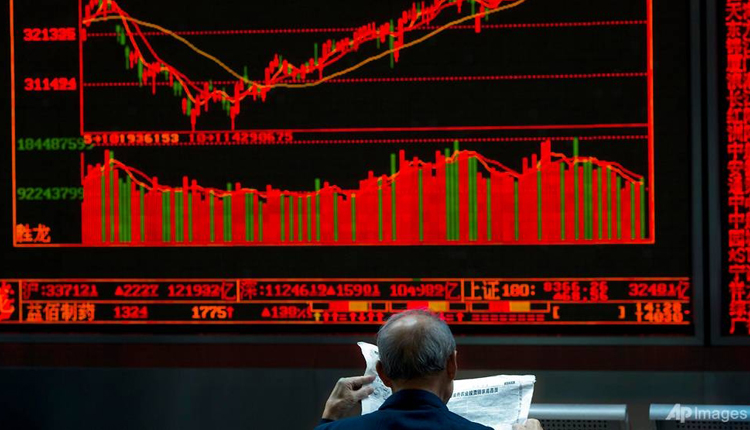Asian markets rose in Tuesday afternoon trade following record closes overnight on Wall Street.
Shares in Japan led the region following a return from a Monday holiday. The Nikkei 225 surged around 2 percent as shares of index heavyweight Softbank Group soared more than 2.5 percent, while the Topix index jumped 1.74 percent. Both indexes were poised to close at their highest for 2019.
Mainland Chinese stocks were higher by the afternoon, with the Shanghai composite up 0.68 percent and Shenzhen composite gaining 0.419 percent. The Shenzhen component added 0.63 percent.
Hong Kong’s Hang Seng index was 0.53 percent higher as shares of Chinese tech juggernaut jumped 1.83 percent.
A private survey of China’s services sector showed activity slowing to a eight month low in October. The Caixin/Markit services Purchasing Managers’ Index (PMI) for October came in at 51.1 — its lowest reading since February. The 50-point level separates expansion from contraction in PMI readings.
In South Korea, the Kospi was 0.15 percent higher.
Meanwhile, Australia’s S&P/ASX 200 rose 0.13 percent. The moves came after the Reserve Bank of Australia (RBA) kept interest rates unchanged on Tuesday.
“The Board will continue to monitor developments, including in the labour market, and is prepared to ease monetary policy further if needed to support sustainable growth in the economy, full employment and the achievement of the inflation target over time,” RBA Governor Philip Lowe said in a statement announcing the interest rate decision.
Following the announcement, the Australian dollar changed hands at $0.6902, slipping from the $0.692 handle on Monday.
Overall, the MSCI Asia ex-Japan index traded 0.38 percent higher.
All three major U.S. indexes touched record highs overnight on Wall Street. The Dow Jones Industrial Average added 114.75 points to close at 27,462.11 — its first all-time high since mid-July.
The S&P 500 also added 0.4 percent to finish at a fresh all-time high of 3,078.27. The Nasdaq advanced 0.6 percent to close at 8,433.20, also reaching record levels.
On the trade front, Chinese President Xi Jinping on Tuesday called for “consultation and cooperation” to resolve international disputes. Xi’s remarks, made at the opening ceremony of the China International Import Expo, did not specifically mention the U.S., which Beijing has been locked in a trade fight with for more than a year.
That came following recent positive developments regarding the ongoing U.S.-China trade war. China said Friday it reached a consensus with the U.S. in principle following talks last week. Last month, U.S. President Donald Trump said both sides had come to a “very substantial phase one” trade agreement that is expected to be signed later in November.
“The market does seem far too focused on a China-U.S. trade deal,” Steve Goldman, managing director at Kapstream Capital, told CNBC’s “Street Signs” on Tuesday. “In the short run we’ll have some sort of phase one (deal) which I won’t view as very meaningful.”
Still, Goldman added that such a move is likely to “leave a fairly positive tone to markets, hopefully through year-end.”
Currencies and oil
The U.S. dollar index, which tracks the greenback against a basket of its peers, was at 97.587 after rising from levels around 97.2 yesterday.
The Japanese yen, often seen as a safe-haven currency in times of market uncertainty and turmoil, traded at 108.78 per dollar after weakening from levels below 108.5 in the previous session.
Oil prices were little changed in the afternoon of Asian trading hours, with international benchmark Brent crude futures largely flat at $62.15 per barrel. U.S. crude futures were fractionally lower at $56.49 per barrel.
Source: CNBC
